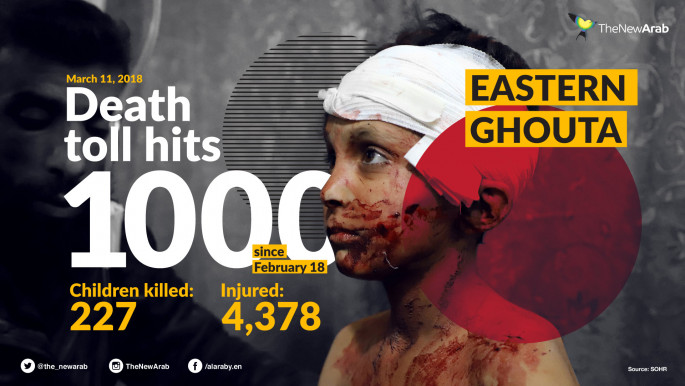Eastern Ghouta evacuations begin for sick and wounded civilians
Evacuations from Syria’s eastern Ghouta began on Tuesday, where sick and injured civilians were allowed passage out of the besieged rebel-held enclave, the first medical evacuation since the Syrian regime’s brutal assault began three weeks ago.
Witnesses reported women carrying infants, men hobbling on crutches and others on wheelchairs exiting through the al-Wafideen crossing.
Over 1,100 civilians have been killed since the Syrian regime escalated its military offensive in Eastern Ghouta near the capital.
The patients who left the town of Douma, were the first of several batches according to Yasser Delwan, a political official with the Jaish al-Islam rebel faction.
The evacuees are from a list of nearly a thousand people which the UN has said are in need of emergency treatment outside. On Monday, Jaish al-Islam said it had reached a medical evacuation deal with the Syrian regime’s key ally Russia following indirect talks.
Defying global calls for a ceasefire, Syria's government has pursued a ferocious Russian-backed air campaign and ground offensive to capture the region, the last rebel bastion on the capital's doorstep.
In three weeks of fighting, it has overrun more than half the area and split the remainder into three pockets, isolating the urban hub of Douma from the rest of the enclave.
The death toll of 1,100 civilians includes 219 children. More than 4.350 have been wounded.
Aid groups and NGOs have slammed the regimes brutality, with Save the Children describing the extent of the campaign's destruction as surpassing even the Aleppo crisis in 2016.
The UN called for immediate action to help the children caught up in the fighting. In an address to the UN Human Rights Council, Kate Gilmore, the UN Deputy High commissioner for Human Rights voiced particular concern for the 125,000 children trapped in Eastern Ghouta, "many acutely malnourished, most profoundly traumatised."
"What is happening to those children is too graphic for our TV screens, but not graphic enough it seems to motivate those who can stop the senseless violence to do so," she said.
"Is it not tantamount to a monstrous indifference to the suffering of children that Security Council resolutions for ceasefires are flouted?" she asked.
The UN's children's agency UNICEF issued a blank statement in response to the unprecedented levels of violence. "UNICEF is issuing this blank statement. We no longer have the words to describe children's suffering and our outrage," it said.
"Do those inflicting the suffering still have words to justify their barbaric acts?"
A full two-thirds of Syria's 8.4 million children need humanitarian assistance, while one million of them live in areas that are difficult to reach by aid convoys and 170,000 in besieged areas, according to UN figures.
"The scope, the scale, the gravity of the crimes against the children of Syria are just shocking," Gilmore told reporters, lamenting that the international community had "failed by every known measure and that should shake us to the core of our humanity."
Eastern Ghouta is home to more than 400,000 people living under a crippling regime siege, with little access to food or medical resources. World leaders and government officials have sharply criticised the Assad regime for its indiscriminate bombing and called for an immediate halt.
The escalating bombing campaign, and the division and isolation of the enclave, suggests the regime is paving way for a ground assault soon. Held by rebels since 2012, Eastern Ghouta is the last opposition pocket around Damascus and President Bashar al-Assad is keen to retake it, seemingly at any cost.
The Syrian Observatory for Human Rights, a Britain-based war monitor, said on Monday that about 511,000 people had been killed since the Syrian war began seven years ago.
The Observatory said about 85 percent of the dead had been killed by government forces and their allies.



